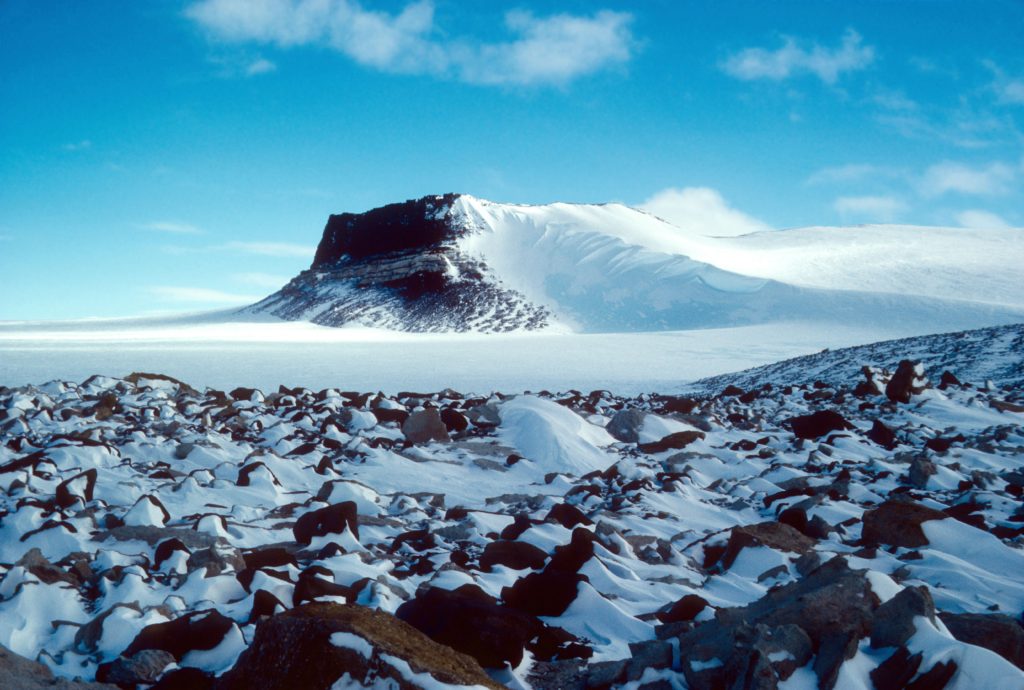 Ice sheets are vulnerable to melting in a warming world.
Ice sheets are vulnerable to melting in a warming world.
Reed Scherer, professor of geology at Northern Illinois University, takes a look back in history to help predict the future.
As a youngster in Brooklyn, N.Y., Reed Scherer loved the ocean and the diversity of its creatures. By age 7, he had started collecting fossils, and by fifth grade, classmates had affectionately dubbed him the “ mad scientist.” From those childhood interests blossomed a research specialty that is helping scientists better understand one of the most pressing problems of our day: climate change. Scherer is an internationally respected geologist whose research has taken him around the globe and beneath the Antarctic Ice Sheet. He was a key member of a research team that tackled the ongoing changes in the ice sheets and other studies of climate change, and he has published numerous studies in top-tier journals such as Nature, Science and, most recently, Nature Communications.
Fossils and Rising Sea Levels
Why are 3-million-year-old microscopic ocean fossils found high in Antarctica’s Transantarctic Mountains? Scientists have debated this question for decades.
In our new study we describe how the fossils came to rest in the mountains.
Our findings add to mounting evidence that parts of the massive East Antarctic Ice Sheet, as well as the more vulnerable West Antarctic Ice Sheet, have a history of instability during the Pliocene Epoch, about 3 million years ago, when the world was slightly warmer than it is today. 
That means the ice sheets could be vulnerable to significant retreat and rapidly rising seas in a warming planet. When ice sheets melt, ocean levels rise, with devastating consequences on coastal communities.
The new model shows that during the warm Pliocene ice retreated by as much as 300 miles, raising sea level by more than 50 feet. Ice-filled basins became ocean, with prolific growth of microscopic plankton, known as diatoms. The diatoms then accumulated as fossils on the seafloor.
After losing the heavy ice, the coastline flexed upward, exposing previously submerged sea floor, now strewn with tiny diatom fossils, to strong winds. Over time, the winds lifted and carried the diatoms to the tops of the Transantarctic Mountains.
So what does this mean for our future? 
Global warming is currently raising sea-level, but collapsing ice sheets would greatly accelerate the rise. Burning fossil fuel has now artificially raised the atmospheric CO2 concentration to levels matching that of the warm Pliocene, threatening the ice sheets.
Importantly, the models show that the rate of sea-level rise could be slowed—if the world cuts back on its carbon dioxide output. We’d still have a problem, but by acting, we could buy some time.


Comments
5 responses to “Reed Scherer, Northern Illinois University – Fossils and Rising Sea Levels”
Sad to see that some at NIU have confused atmospheric science with the keystone political issue of the global socialist movement. No one disputes the issue of climate change as it has been present since man has been able to record it. How much of that change can be attributed to the consumption of fossil fuels is not a settled argument since all predictions are based on computer models designed to achieve a predetermined objective as was illustrated in the East Anglia incident. When scientists are able to determine the effects of solar flares on the sun’s surface and variations of the earth’s orbit around the sun and “wobble” of the earth’s rotation on its axis, then we might have something to debate. Until then, this is all politics.
Sad to see that some people sill think global warming is just politics. It took 2 years to first navigate the Northwest Passage. Now anyone can make that trip, as a summer vacation, on a cruse ship.
Dear Robert.
Please refrain from commenting as an expert when it is obvious that you are not clear on basic climate and paleoclimate facts. Just a troll. Considering that your post is short it is amazing how many objectively incorrect things you cite. This has nothing to do with flares or wobbles. There’s no need to further itemize your misinformation because it is objectively clear that politics is all that motivates you. This is clear by your referencing “East Anglia” referring to the the hacking and highly selective and distorted leaking of out of context emails that, following several investigations, clearly demonstrated no scandal and no distortion of scientific evidence. Finally, science is not a “Socialist movement” and my research is quite independent of political leanings.
R. Scherer, Northern Illinois University
Robert Haase… sorry to tell you, in spite of RW media, there is no “global socialist movement”. There is ample data to drive conclusions (note use of the scientific method) that acceleration of climate change is strongly correlated with the industrial revolution and burning of fossil fuels. Other factors that you cite are likely secondary contributors or less significant.
Or you can simply wait around until there is 100% conclusive data collection and certainty and take action… of course, you may be under water. We can either be proactive as a society or reactive.
Please, PLEASE add captions to this video. Mr (or Ms) Moderator pass this on to the appropriate people. My complaint does not need to be posted.